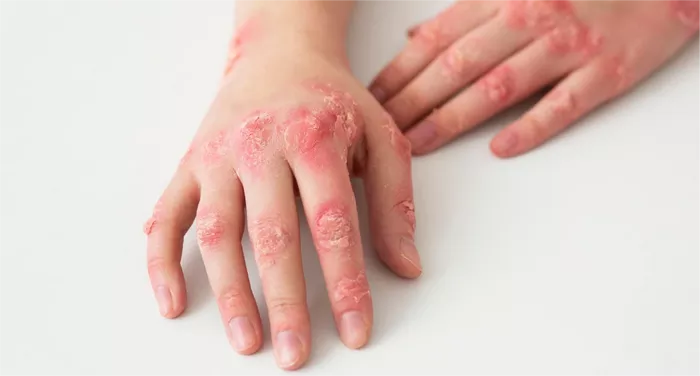Dyshidrotic eczema, also known as dyshidrosis or pompholyx, is a chronic skin condition characterized by small, itchy blisters on the hands and feet. While its exact cause remains elusive, various factors can exacerbate symptoms, leading to discomfort and frustration for those affected. In this article, we delve into the common triggers of dyshidrotic eczema, explore the mechanisms behind their action, and provide practical strategies for managing this condition.
Common Triggers
1. Stress and Anxiety: The mind-skin connection is well-established, and stress can wreak havoc on skin health. For individuals with dyshidrotic eczema, heightened stress levels often correlate with increased flare-ups. Stress management techniques, such as meditation, yoga, and deep breathing exercises, can play a pivotal role in symptom control.
2. Contact Allergens: Certain substances, including nickel, cobalt, and fragrances, can trigger allergic reactions in susceptible individuals, exacerbating eczema symptoms. Identifying and avoiding these allergens through patch testing and careful product selection is essential for managing dyshidrotic eczema.
3. Irritants: Exposure to harsh detergents, soaps, and solvents can strip the skin of its natural oils, leading to dryness and inflammation. Opting for gentle, fragrance-free skincare products and wearing protective gloves when handling irritants can help mitigate flare-ups.
4. Seasonal Allergies: Pollen and other environmental allergens prevalent during certain seasons can aggravate dyshidrotic eczema symptoms. Monitoring pollen counts and taking appropriate precautions, such as staying indoors during peak allergy seasons or using air purifiers, may offer relief.
5. Excessive Sweating: Sweat can act as a skin irritant, especially in individuals prone to eczema. Managing excessive sweating through breathable clothing, frequent showers, and the use of antiperspirants can help prevent flare-ups associated with sweat-induced irritation.
6. Certain Foods and Dietary Factors: While the link between diet and eczema remains a topic of debate, some individuals may experience flare-ups after consuming certain foods or food additives. Keeping a food diary and undergoing supervised elimination diets under the guidance of a healthcare professional can help identify trigger foods and tailor dietary modifications accordingly.
7. Hormonal Changes: Hormonal fluctuations, such as those occurring during puberty, pregnancy, or menopause, can influence eczema symptoms. Women may notice changes in their skin during menstrual cycles or while taking hormonal contraceptives. Understanding these hormonal triggers and adapting skincare routines accordingly can aid in symptom management.
Individual Variability
It’s important to recognize that triggers can vary significantly between individuals. What exacerbates one person’s eczema may have little to no effect on another. Therefore, identifying personal triggers through diligent observation and journaling is paramount for effective management. A trigger that often goes unnoticed in one’s environment or lifestyle may hold the key to achieving long-term symptom control.
Mechanism of Action
The triggers mentioned above can instigate inflammation and eczema flare-ups through various mechanisms. Contact allergens and irritants penetrate the skin barrier, triggering an immune response characterized by inflammation and the release of histamines. Stress, meanwhile, activates the body’s stress response system, leading to the release of cortisol and other stress hormones that can disrupt the skin’s natural balance. Excessive sweating exacerbates eczema by creating a warm, moist environment conducive to bacterial growth and skin irritation.
Management Strategies
1. Stress Management Techniques: Incorporate stress-reducing activities into your daily routine, such as mindfulness meditation, yoga, or progressive muscle relaxation.
2. Allergen Avoidance Tips: Identify and eliminate potential allergens from your environment, including nickel-containing jewelry, fragranced products, and known contact allergens.
3. Skincare Routines for Sensitive Skin: Use mild, fragrance-free cleansers and moisturizers specifically formulated for sensitive skin to maintain the skin’s barrier function.
4. Moisturizing and Hydration Strategies: Apply moisturizers regularly to keep the skin hydrated and prevent dryness. Consider using occlusive agents, such as petroleum jelly or dimethicone, to lock in moisture.
5. Dietary Considerations and Potential Elimination Diets: Work with a healthcare professional to identify and eliminate trigger foods from your diet. Consider incorporating anti-inflammatory foods rich in omega-3 fatty acids, such as fatty fish, flaxseeds, and walnuts.
Medical Treatments
While lifestyle modifications play a crucial role in managing dyshidrotic eczema, medical treatments may be necessary for more severe cases. Topical corticosteroids, calcineurin inhibitors, and phototherapy are commonly prescribed to reduce inflammation and alleviate symptoms. In severe or refractory cases, systemic immunosuppressants may be recommended. Consultation with a dermatologist is advised to develop a personalized treatment plan tailored to your individual needs.
Lifestyle Modifications
In addition to the strategies mentioned above, adopting certain lifestyle modifications can further minimize exposure to triggers and manage flare-ups effectively:
- Wear gloves when performing tasks that involve contact with potential irritants or allergens.
- Use hypoallergenic laundry detergents and fabric softeners to minimize skin irritation from clothing.
- Maintain a healthy lifestyle, including regular exercise, adequate sleep, and a balanced diet rich in fruits, vegetables, and whole grains.
Conclusion
In conclusion, understanding the common triggers of dyshidrotic eczema and implementing targeted management strategies is essential for achieving optimal symptom control. By identifying personal triggers, adopting stress management techniques, and adhering to a comprehensive skincare routine, individuals can effectively manage their condition and improve their quality of life. For individuals struggling to control their symptoms, consultation with a dermatologist is recommended to explore medical treatment options and develop a personalized care plan.
























